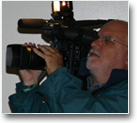 Trent University’s Dr. Dennis Murray Receives $120,000 to Study Impact of Habitat Changes on Lynx and WolvesFOR IMMEDIATE RELEASE New NSERC Funding Awarded to Outstanding Researchers Poised to Become International Leaders in their Field Tuesday, October 21, 2008, Peterborough Dr. Dennis Murray, Canada Research Chair in Terrestrial Ecology at Trent University, is one of only a small group of researchers to recently be awarded a $120,000 Natural Science and Engineering Research Council (NSERC) Discovery Accelerator Supplement for his outstanding research into the study of range limits of lynx and eastern wolves. The award is designed to provide substantial and timely resources to a small group of outstanding researchers who have a well-established research program, and who show strong potential to become international leaders in their respective area of research. Professor Murray’s research studies the impact of habitat changes on lynx and wolves. “We suspect that commercial logging and forest thinning practices are deleterious to lynx and snowshoe hares because marginal habitat is unable to support high densities of snowshoe hares,” stated Prof. Murray. “As well as the fact that lynx are exposed to intense commercial trapping where human access is facilitated.” In his work on wolves, Prof. Murray’s research suggests that the southern distribution of eastern wolves is limited by hybridization with coyotes. Interested in understanding the underlying factors governing wolf-coyote hybridization dynamics, and determining if the zone of hybridization currently is stationary or is expanding, Prof. Murray’s research involves radio-collaring wolves, coyotes, and hybrids in and around Algonquin Provincial Park and examining distribution, space and habitat use patterns, and survival and productivity, of these groups. “We are trying to assess the possibility that hybrids are more adept at colonizing fragmented landscape than are wolves, and thereby offer an important genetic threat to wolf populations in human-managed landscapes,” explained Prof. Murray. “Ultimately, we seek to determine the long-term viability and genetic integrity of wolves in and around Algonquin Provincial Park.” -30- For more information, please contact: |
































